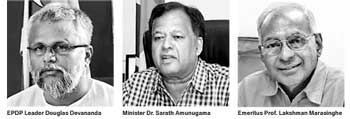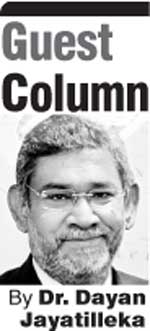Friday Feb 13, 2026
Friday Feb 13, 2026
Saturday, 11 November 2017 00:19 - - {{hitsCtrl.values.hits}}
 The marathon opening session of the Constitutional Assembly was extraordinarily important and successful, most certainly not in the political sense, but in the pedagogical and psychological senses. It was an airing, an outpouring, of opinions covering 60 years of our post-Independence history.
The marathon opening session of the Constitutional Assembly was extraordinarily important and successful, most certainly not in the political sense, but in the pedagogical and psychological senses. It was an airing, an outpouring, of opinions covering 60 years of our post-Independence history.
These cathartic benefits apart, the political exercise is quite badly damaged, almost certainly deadlocked, because the real dynamics of politics are about to crash into and carve through the Constitutional process.
The UNP (and most UNF) speakers arrogantly and uniformly argued for a new constitution which abolished the executive presidency. There was no daylight between the UNP and TNA speakers (except perhaps for Ajith P. Perera) and the country saw a UNP-TNA axis, a minoritarian bloc reminiscent of the ‘Hath Havula’ profile of 1965-1970 and Ranil’s CFA Government of 2001-2004.
Well and good, but the UNP cannot have a new Constitution even if it stands on its head, not only because it will be defeated at a referendum but also because it was not elected with a two thirds majority, unlike the governing parties of 1972 and 1978. If and when it ever gets a two thirds majority at a national election it can go for a new Constitution (it may still be defeated at a referendum) but until then it should stop wasting everybody’s time and get on with managing the manifest crisis.
There is another reason that a new Constitution is dead in the water or soon will be. Not even the UNP would be suicidal enough to submit a Final Report of the Steering Committee which can be a large electoral bulls-eye, before the Local Government elections, nor head from a damaging bond scam report and a body blow at the local authority elections, into a geo-storm of a loser-lose-all referendum on quasi-federalism in mid-late 2018, under 24 months away from national elections.
The New Constitution Project is for all practical purposes over during this term of this one-term UNP-driven Government. The same goes for any dramatic amendment which would be referred by the Supreme Court for a referendum. With an economic growth rate of 4%-4.5%, lower than our average wartime growth rate, which Government, especially one with a pronounced minoritarian discourse and profile, would survive a protest vote at a referendum?
Does this mean that the camp of those opposing the new Constitution simply cheer, pat themselves on the back and go home? Some would say yes, while others would say no, because they are opposed to devolution and would argue that one has to stay vigilant against any measures to extend or implement 13A. Though I belong to the camp of those who are opposed to the new constitution, I am also one of those, alongside the JO ‘left’ (most prominently but not only Vasudeva Nanayakkara) and who have long accepted the existence of the Tamil ethno-national question and the need to effectuate devolution so long as it is centripetal (coming together) rather than centrifugal (moving apart).
This does not mean that we must fall for the myth that the Tamil Question has not been politically addressed. It has, with the Accord and the 13th Amendment, and many good men, including several of my friends and comrades died with or without wielding weapons, in its defence, in the southern and northern civil wars. Though addressed, the Tamil question has been insufficiently addressed—there is a modest deficit. That is what has to be attended to now, through pragmatically adjusting the long-existing solution and upon its basis.
There is another strategic imperative which requires even those of us who oppose a new Constitution, to be open to the question of further reform. It is that ideologues of the Tamil Diaspora are planning to divide Sri Lanka by projecting and positioning the Tamil North as a strategic ally of India in its competition with China. This is the line that is being urged on CV Wigneswaran and the Northern PC and it is doubtless the line that the CVW-Gajan-Suresh-Sivajilingam tendency is operating on.
In a recent article in the Delhi based journal ‘The Diplomat’ (Nov 7, 2017), Ana Pararajasingham concludes as follows: “…Realpolitik, however, tells us that it is not international law but international actors pursuing their own interests that dictates international intervention. Should Wigneswaran be able to factor into his argument that an autonomous northeast could help counter Beijing’s growing influence over Colombo, he may well succeed in winning international support for self-rule for Tamils...”
The caption of his article is ‘Sri Lanka›s Proposed Constitution Comes Under Attack’ while the more significant strapline is ‘International interest, not international laws, will deliver autonomy to Sri Lanka’s Tamils.’
In order to block this, we Sri Lankan have to do two things at the same time: (a) keep India on side or neutralised by a sufficiency of devolution to the Tamil areas so as not to permit Tamil Nadu to become an effective lobby against us, while (b) stopping well short of permitting a degree of autonomy that can tempt or facilitate either Catalan/Kurdish or Kashmiri-type separatism or merger with Tamil Nadu in a Greater Tamil Eelam. That is why we can neither abandon the ethno-political reform process nor allow it to go beyond certain strategic parametric limits.
Contrary to yet another liberal myth, it is not safe, in this reform effort, to go beyond 13A, because there is NO Indian guarantee against a Greater Tamil Eelam because such a Greater Tamil Eelam could/would be part of India, while no longer being part of Sri Lanka. Mahinda Rajapaksa’s correct formulation of ‘13 Plus’ is not located beyond and does not go beyond 13A but is built upon 13A.
The mistake that the TNA and the so-called international community made was to place its bets on the neoliberal Ranil-Chandrika-Mangala troika, rather than the one man who has the legitimacy and the real estate, namely President Sirisena, who will be in office till early 2020.
Only he can pilot any political settlement through, but he will see no reason at all, to risk all at a referendum. The hedging proviso of his winning election manifesto of January 2015, cited by Nimal Siripala and in the superb speech by Susil Premjayanth, rules out not only a new Constitution but also any drastically oversized amendments.
 The cosmopolitan (neo) liberal democrats say that the south must solve the problem while Sampanthan is on the other side of the table, but they must similarly realise that the problem must be settled while President Sirisena – not Ranil, given the juvenile jollity of his address to the Assembly, and his vulnerability to the radioactive fallout of the bond scam – is seated at the head of the table.
The cosmopolitan (neo) liberal democrats say that the south must solve the problem while Sampanthan is on the other side of the table, but they must similarly realise that the problem must be settled while President Sirisena – not Ranil, given the juvenile jollity of his address to the Assembly, and his vulnerability to the radioactive fallout of the bond scam – is seated at the head of the table.
To reiterate: the Tamil problem must at least be managed and settled in the interim while President Sirisena is at the head of the table. Only an all-parties consensus will not be de-stabilising for his administration.
If one listened closely enough to the debate, as I did, it was possible to discern the parameters of the possible and to trace the contours of a consensus even in the hyper-polarised Constitutional Assembly debate. What isn’t possible is leaping the limits of the 13th amendment, still less linguistic scamming and conceptual counterfeiting Articles 2 and 9 regarding the unitary character of the state and the status of Buddhism.
The SLFP and in all probability the President is against any move that requires a referendum, which means any change that touches the entrenched clauses of the Constitution. This brings the SLFP onto the same page as the Joint Opposition which has made clear in its written submission that it will fight tooth and nail against any tampering with those clauses.
How then to proceed and what to proceed with? Douglas Devananda who turns 60 on 10 November, has been the only really reliable long term ally of the Sri Lankan state, has spent quite a few of those years arguing that all that is possible and necessary at the current moment is the implementation of the 13th amendment, and he has been proven right in so doing.
But is it possible to implement 13A while doing two seemingly contrary things at the same time, namely to freeze the contentious issue of police powers while rationalising the Concurrent List and swapping some powers between centre and periphery, as Mahinda Rajapaksa planned to in 2011, before the TA wrecked it by seeking to go beyond the arrangements on land in the 13th amendment, which had been painstakingly negotiated with and by Gamini Dissanaike and Sarath Amunugama?
There are two people, one a tough minded practitioner, the other a distinguished scholar, who know a legitimate and transparent way in which the 13th amendment can be revised and re-set without risking a referendum or even the polarising contentiousness of the dubious procedure adopted over the PC bill. These are Douglas Devananda and Emeritus Prof. Lakshman Marasinghe.
Transparent tweaking of 13A through pragmatic domestic diplomacy—negotiations--undergirded by all-parties consensus, is the only way to go, from here on in. The roadmap and formula can be worked out by two scholars, Lakshman Marasinghe and Sarath Amunugama. There is nothing wrong with the Constitutional reform process that can’t be fixed by a paradigm shift from a ‘new Constitution/radical reform’, to revision, renovation, re-adjustment and re-set; from liberal idealism to sheer Realism.